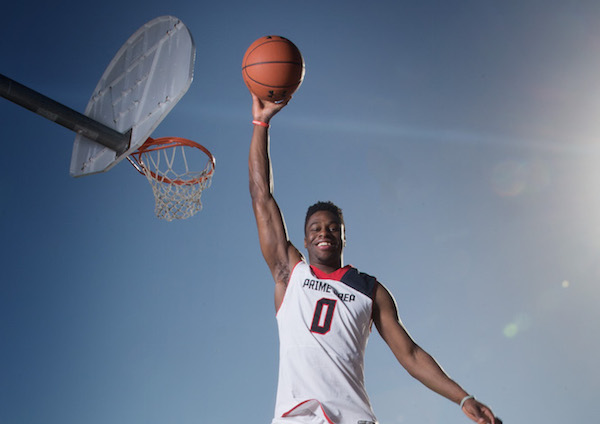It’s understandable that Nuggets fans are a pessimistic bunch. After all, they’ve had their optimism dulled over the years by the constant grinding of history.
They watched the promise of David Thompson get wasted away by drug abuse. They saw a talented young team start to unravel when LaPhonso Ellis suffered a knee injury during an offseason workout. They watched Dikembe Mutombo leave town in exchange for nothing. And they felt scorned when Carmelo Anthony decided he’d rather live in New York than play in the Mountain Time zone.
So they probably didn’t quite know how to react last Thursday night when good news arrived.
After decades of disappointment, bad luck and missteps, something finally broke in the Nuggets’ favor. When Emmanuel Mudiay fell to the No. 7 overall pick in the NBA Draft, lower than the 6-foot-5 point guard had been projected to go, it was a ray of sunshine for long-suffering fans in Denver.
Hope had arrived. With Mudiay in the mix, a team in desperate need of a star finally had one.
As a result, a better future lies ahead. The promise of being relevant seems believable. And dreams of being a true contender no longer seem so foolish.
That may seem like a lot to put upon a 19-year-old kid. But even at a young age, Mudiay has all the makings of a player who can transform a franchise.
In order to win in the NBA, a team needs an alpha male; they need a leader who will take charge, keep everyone else in line and carry the franchise on his back. The past 30 years of the league are littered with champions that possessed this type of player – from Larry Bird and Magic Johnson to Michael Jordan and Kobe Bryant to Tim Duncan and LeBron James.
Mudiay has shown that type of personality while on the court. And during his pre-draft visit to Los Angeles, the point guard noted something he has in common with Bryant.
“I admire his determination,” the soon-to-be rookie said of the five-time NBA champion. “He’s got a dog in him, and that’s how I approach the game.”
But it’s not just about being a commanding personality; that’s only half of the equation. The equally important part of the quotient is the message that the Type A leader is sending. Each of the champions listed above has one trait in common: They put winning above everything else.
Rings mattered more than anything. It wasn’t about living the NBA lifestyle, being a star or making friends along the way. Those things were nice, but they weren’t the ultimate goal. They never let those distractions get in the way of winning, and they wouldn’t put up with anyone who did let that happen.
While young, Mudiay appears to have that mindset. He led his high school team to state titles in both his freshman and sophomore seasons, before seeing his prep career get derailed by an ill-fated decision to move to Deion Sanders’ prep academy. And during his one season in China, he bounced back from an injury that would have sent most foreigners packing to lead his team to a crucial postseason victory.
He explained his mindset when he arrived in the Mile High City.
“Losing makes me sick,” Mudiay told the Denver media last week during his introductory press conference. “I can’t stand it. If I’m not winning, I’m not happy.”
While just words, those are of the emphatic nature. And they touch on a key trait that most successful people possess; they hate losing more than they love winning. Everyone likes to be the champ, but only a few are willing to do anything to avoid the feeling of not being one.
That’s where hard work comes in. By all accounts, Mudiay is a gym rat; he’s a player who is constantly working on his game, even during the time when a sprained ankle had him in a boot during his stint in China. As a result, he’s maximizing his God-given talents.
Long-time basketball observers have compared Mudiay to such greats as Kobe and Elgin Baylor. He’s also been mentioned in the same breath as stars of today, including former MVP Derrick Rose and reigning scoring champion Russell Westbrook.
His would-be college coach certainly knew a good thing when he saw it. As soon as SMU head coach Larry Brown saw Mudiay play, there was little doubt that he was watching a future star.
“I started giggling,” Brown told ESPN about his reaction the first time he watched Mudiay scrimmage. At that point in 2012, the Hall of Fame coach told reporters that he was convinced the 16-year-old player could start at the time for half of the teams in the NBA. He also believed that Mudiay was the best young point guard he had ever seen.
Now, he’ll get a chance to prove it in Denver, where he’ll be the cornerstone of the franchise. Not since Anthony arrived 12 years ago have the Nuggets had such a promising building block.
But this one is better. He’s wired differently, possessing a maturity that belies his age. And his priorities are in a better place, the result of a life that has seen more trials and tribulations than any teenager should encounter – from his father passing away when he was an infant to his mother having to flee their war-torn homeland without him and his brothers for a time.
Hope has arrived. And even the most fatigued fans have to be excited about that fact.
The Nuggets will never be the same. Emmanuel Mudiay is in town.
